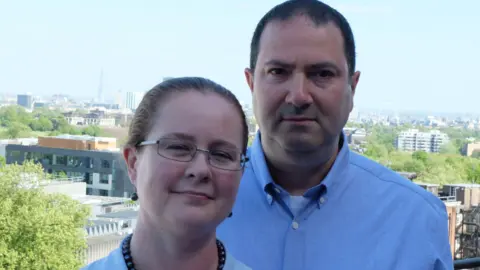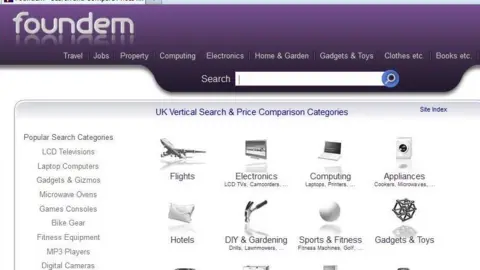We took on Google and made them pay £2bn
 Sivan and Adam Ruff
Sivan and Adam Ruff“Google basically made us disappear from the Internet.”
Launch day. They're equal parts exciting and scary for many start-up business founders, but they don't get any worse than Sivan Ruff and her husband Adam experienced.
It was June 2006 and the couple's trailblazing price comparison website Foundem – for which they had quit well-paying jobs and built from scratch – had just gone live.
They didn't know it at the time but that day, and those that followed, would mark the beginning of the end for their company.
Foundem suffered a Google search penalty, prompted by the search engine's automatic spam filter This pushes the website down the list of search results for relevant queries like “price comparison” and “comparison shopping”.
This means the couple's website, which is charged a fee by another website when customers click on their product listings, struggles to make any money.
“We were monitoring our pages and how they were ranking, and then we saw them drop almost immediately,” Adam says.
While the launch day for Foundem didn't go as planned, it would mark the beginning of something else – a 15-year legal battle that ended A record €2.4bn (£2bn) fine for Google, which was deemed to have abused its market dominance.
The case has been hailed as a watershed moment in Big Tech's global control.
Google spent seven years fighting that ruling, issued in June 2017, but in September this year Europe's top court – the European Court of Justice – rejected its appeal.
Speaking on Radio 4's The Bottom Line In their first interview since that final verdict, Sivan and Adam explained that at first, they thought their website's tumultuous start was a mistake.
“We initially thought it was collateral damage, that we were getting false positives detected as spam,” says 55-year-old Shivan. “We just assumed we had to go to the right place and it would turn around.”
“If you're denied traffic, you have no business,” adds Adam, 58.
The couple sent multiple requests to Google to lift the restrictions but, more than two years later, nothing has changed and they said they have received no response.
Meanwhile, their website was “ranking perfectly naturally” on other search engines, but according to Shibun, it didn't really matter because “everyone was using Google.”
The pair would later discover that their site wasn't the only one to be hit by Google – around 20 other claimants, including Kelku, Trivago and Yelp, were found guilty and fined by the tech giant in 2017.
Adam, who built a career in supercomputing, says he had a “eureka moment” for Foundem while smoking a cigarette outside his previous employer's office.
Back then, price comparison websites were in their infancy and each specialized in a specific product. But Foundem was different because it allowed customers to compare many products, from clothes to flights.
“Nobody else was anywhere close to it,” says Bim Sivan, himself a software consultant to several major global brands.
In its 2017 ruling, the European Commission found that Google was Illegally promoted its own comparison shopping service in search results, while demeaning competitors
Ten years ago, though — when Foundem launched — Adam says he had no reason to assume Google was intentionally anti-competitive in online shopping. “They weren't really serious players,” he says.
But in late 2008, the couple began to suspect foul play.
It was three weeks before Christmas and the pair received a message that their website was suddenly slow to load. They thought it was a cyber attack, “but it was actually that everyone started looking at our website”, laughs Adam.
Channel 5's The Gadget Show has just named Foundem as the best price comparison website in the UK.
“And that was really important,” Sivan explains, “because we then reached out to Google and said, look, surely it's not going to benefit your users to find us.
“And it still got it from Google, not completely ignored, but basically 'bog off'.”
“At that point we knew, OK, we had to fight,” Adam said.
 foundem
foundemThe couple went to the press with limited success and took their case to regulators in the UK, US and Brussels.
Later – with the European Commission (EC) – that case eventually led to the initiation of an antitrust investigation in November 2010. The couple's first meeting with regulators took place in a portable cabin in Brussels.
“One of the things they said was if this is a systemic problem, why are you the first person we're looking at?” Shiva remembers. “We said that we're not 100% sure, but we suspect that people are afraid, because all businesses on the Internet basically depend on Google for their traffic.”
'We don't like bullies'
The couple were in a hotel room in Brussels, just a few hundred yards from the commission building, when competition commissioner Margaret Vestager finally announced the ruling that they and other shopping websites had been waiting for.
But there was no popping of champagne corks. Their focus then shifts to ensuring that the EC implements its decisions.
“I guess it's unfortunate for Google that they did this to us,” Sivan said. “We were both probably raised under the delusion that we could make a difference, and we really don't like bullies.”
Even Google's final defeat last month didn't spell the end for the pair.
They believe Google's behavior is anti-competitive and the EC is looking into it. In March this year, under its new Digital Markets Act, the commission launched an investigation into Google's parent company, Alphabet, over whether it prioritizes its own products and services in search results.
A Google spokesperson said: “The CJEU [European Court of Justice] judgment [in 2024] It is only relevant how we have shown product results from 2008-2017.
“The changes we made in 2017 to comply with the European Commission's shopping decisions have worked successfully for more than seven years, generating billions of clicks for more than 800 comparison shopping services.
“For this reason, we continue to vigorously contest the claims made by Foundem and will do so when the court considers the case.”
The raffles are also pursuing civil damages claims against Google, which will begin in the first half of 2026. But when, or if, a final victory came for the couple it was likely to be a Pyrrhic one – they were forced to stop. Foundem in 2016.
The long battle against Google was tough for them too. “I think if we had known it was going to be as many years as it turned out we might not have made the same choice,” Adam admits.


